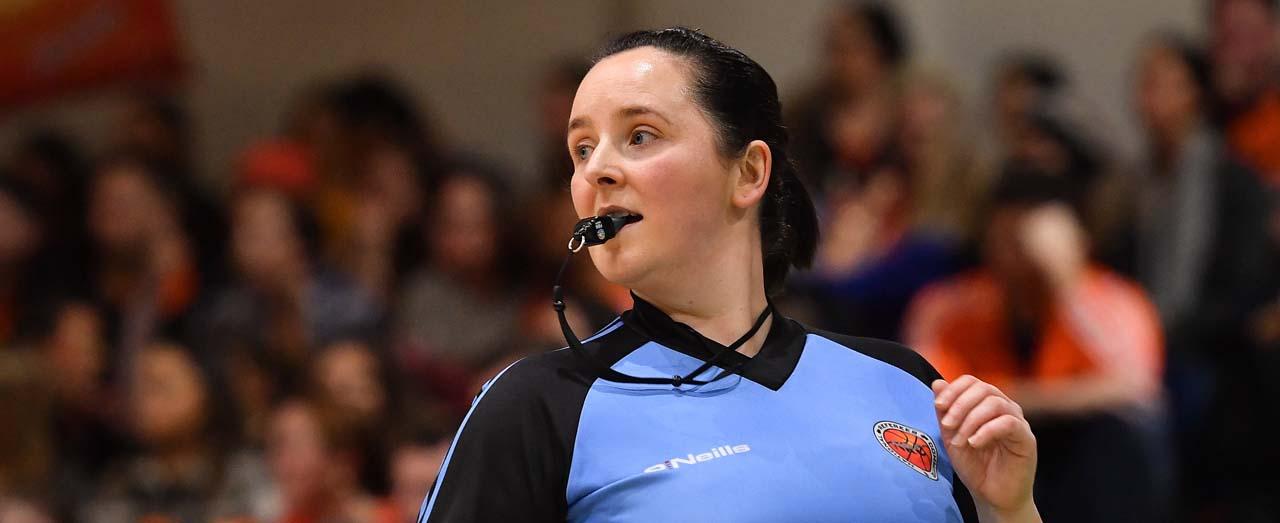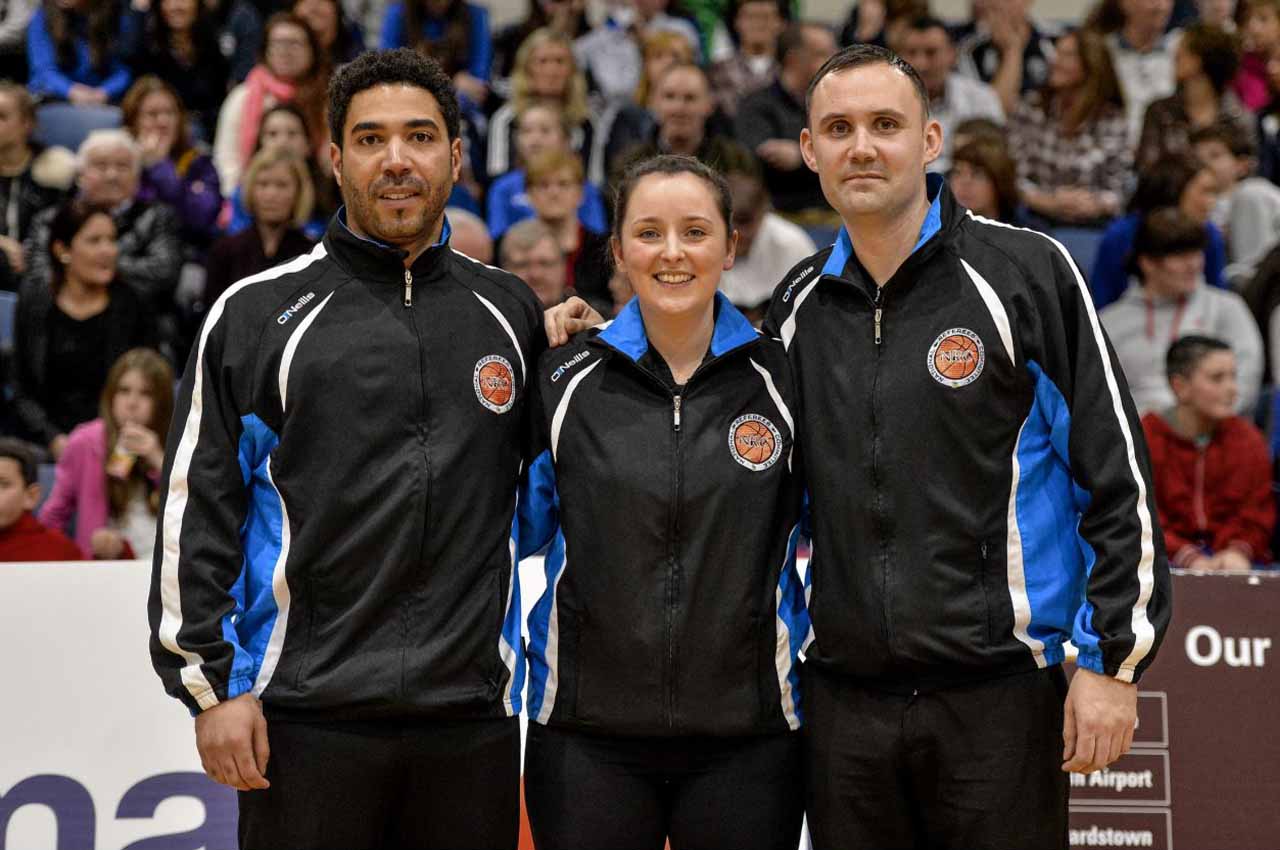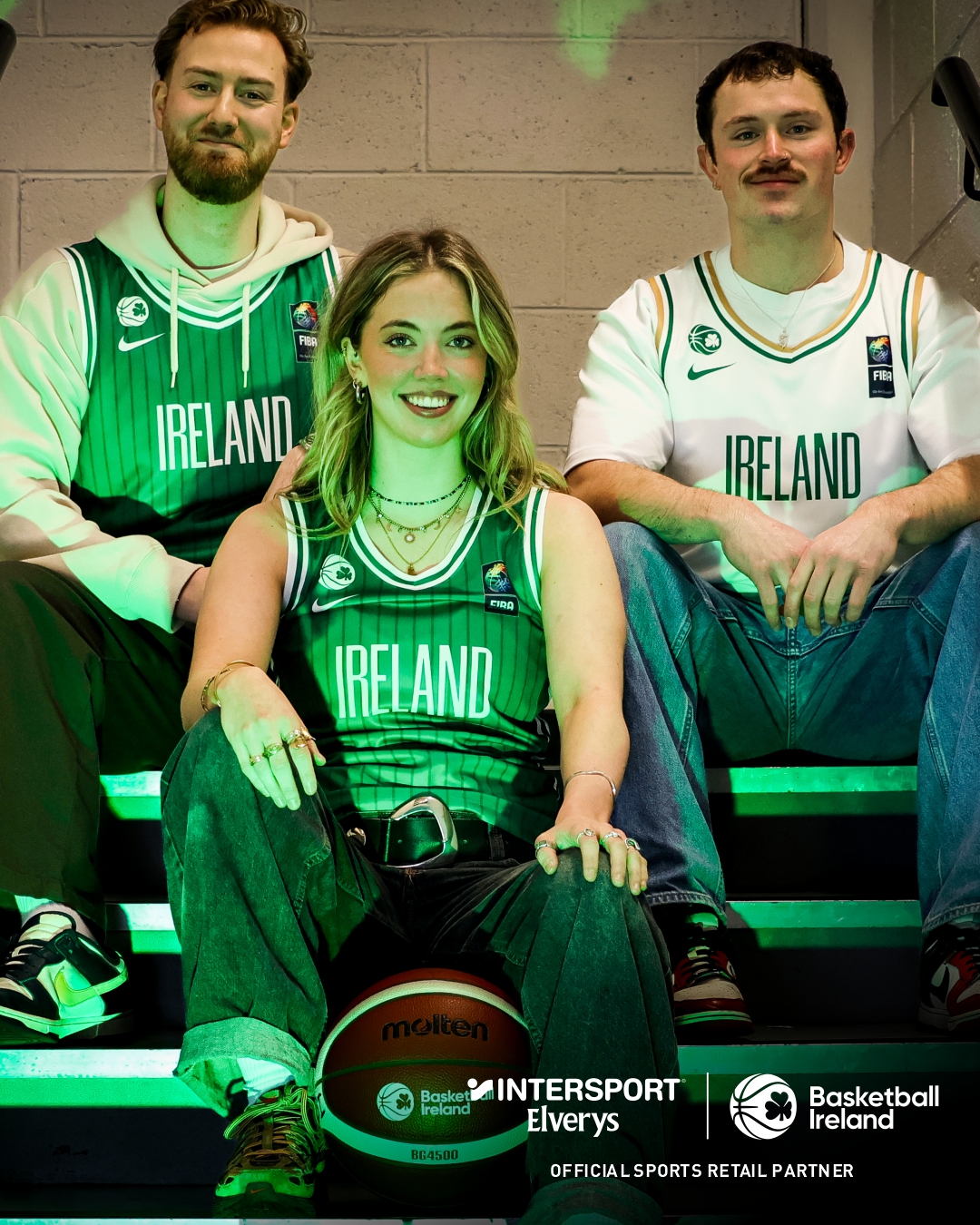Lynda Cassidy

Referee Level: Now retired (covered local league, colleagues League and National League.)
Interview
"Go for it. You bring a unique set of skills that no-one else can, both from the perspective of you as an individual and as a female referee. While it can be hard to break through the barrier of misconceptions of female officials, we bring many benefits to the game compared with our male counterparts – a different leadership dynamic, supportive management style, cooperative problem-solving approach, better communication skills, greater diplomacy, greater empathy ….. the list is endless!"
Can you talk us through your playing background?
I was an underage basketball player with Trinity Meteors in Dublin and a recreational player in college.
How did you get involved in refereeing?
My Dad was a great servant to local league refereeing in Dublin for many years, so I was always around refereeing from a young age. When my club, Trinity Meteors gave me the opportunity to go to the old Dungarvan National Camp to do an introductory referee’s course when I was 17, it was a natural step for me to take.
What kind of games have you refereed over the years?
Everything! Over my many years refereeing I have refereed games at all levels, big and small; local, national, international, friendlies, colleges, schools, 3x3 etc.
Who would you say was a role model for you as a referee and why?
My Dad from the perspective of him giving such a wonderful introduction to refereeing and showing me, you can demonstrate a love and passion for the game and give back in many different ways.
Dave Collings, FIBA, was also a great role model for me. He tutored my introductory referees’ course in Dungarvan and gave me a very early insight into how far you can go if you work hard. For me, Dave was ahead of his time – focusing on the technical aspects of refereeing performance and applying it in a fair and balanced way at all levels.
What is the most important thing for you when refereeing younger/teenage boys and girls?
To be honest, I treat younger players and teenagers differently. For younger players, it is more about teaching and communicating throughout the game. You are there to help them have fun and do the best they can; as a coach but you are helping them understand the rules of basketball.
Teenagers should be at a point whereby they have a good understanding of the rules and spirit of the game. My role is simply to apply the rules within the spirit and intent of the game; I am doing them no favors by letting things slide or not applying the rules in a common-sense manner.
Have you any tips you'd like to share on keeping girls engaged in sport - particularly in the 14-18-year-old age group?
There is more than one way to stay connected with sport, playing is not the only option!
I would emphasise the sense of community and belonging that you feel when you are part of a sport. No matter whether you are a player, referee, coach, manager, table official, supporter or committee member you are part of a community of people. A community where you belong, have value, make friends and create wonderful memories. I would also say it is a mutually beneficial relationship – You get something from the Sport and the Sport gets something from You.

Any tips you would like to give to young referees who are starting out?
Ask loads of questions and persist! It can be difficult to navigate the structures and politics of local and National League refereeing when you first start, but stick with it, it is worth it!
Also, have a peer group and an honest friend(s) within refereeing to give feedback. We learn from each other and support each other as we grow to whatever level is our best. It is also great to have someone to reach out and ask questions / debrief after a game.
When you first stepped up to National League/International level, were you nervous about the step up and how did you deal with that if so?
Yes, I was very nervous, but back in 2000, the structure was such when you stepped up it was a gradual process. You did your “apprenticeship” in each league for several games/seasons before advancing, really honing your skills and cutting your teeth in the tough but excellent Division 1 National Leagues.
Also, when I first stepped into the Men’s Super League it was 2PO! There was nowhere to hide and you either sank or swam; I was lucky to be with a great veteran, Pascal Roche, for my first Men’s Super League game.
The benefits of this system are the gradual nature of progression really helps build confidence and taking on board views and feedback of more experienced co-official at the start also really helped.
What would you say to other female referees who are considering moving up a level in their refereeing careers?
Go for it. You bring a unique set of skills that no-one else can, both from the perspective of you as an individual and as a female referee. While it can be hard to break through the barrier of misconceptions of female officials, we bring many benefits to the game compared with our male counterparts – a different leadership dynamic, supportive management style, cooperative problem-solving approach, better communication skills, greater diplomacy, greater empathy ….. the list is endless!
How do you measure the success of a game?
I measure success two-fold; within the game and within my team.
-Our role as a referee is to facilitate the game within the spirit and intent of the rules. If the officiating crew goes about their business unnoticed in the game, fulling this role, that is what I consider success within a game.
-As a referee and crew chief in an officiating crew, my role is also to provide the best environment for my team to succeed. I consider success as a crew chief in being clear in setting our goals for that game, having the self-awareness to correct if/when needed and offering support to my co-officials both verbally and non-verbally when necessary.
How do you measure success in broader terms?
I am a conscientious person and take great satisfaction from a job well done; so, this, for me, is a good barometer of personal success. I also measure success in broader terms by satisfying my own high standards and expectations.
How important do you think it is for referees to keep learning and developing regardless of the level of experience?
Crucial. The game is constantly evolving and has been at an ever-greater pace over the last 5-6 years.
From a refereeing perspective, rules and interpretations can, and do, change annually; so even at a basic level of refereeing, you must stay on top of things.
But referees must also learn and develop above and beyond just the rules. Referees have to develop a greater understanding of the game – where it is and where it’s going. I would advise any ambitious referee to watch European games and learn from coaches to become a more knowledgeable and rounded referee.
Have you noticed many changes in Ireland in referees over the years? If so, what?
Yes absolutely, to name a few; the standard and professionalism of refereeing has improved, in recent years the age profile has reduced, the level and frequency of education has increased, the use of technology etc.
What changes would you like to see in basketball refereeing in Ireland in the future?
I would like to see a greater number of referee’s reaching higher standards, be that through the grading system or through individual performance; a greater number of high-quality referees drives the competition and standards across all levels of basketball.
However, none of that will have happen without access, access to information on pathways at local and national level, access to education and educational tools, access to tutors, assessors and experienced referee’s at local and national level. Access is both a local and national issue, however strides forward cannot be taken when local and national bodies have infighting and strive for power over their membership.
What is the most valuable lesson you have learned as a player?
My coach was always right!
What is the most valuable lesson you have learned as a referee?
Work hard, be self-aware, be resilient and you’ll go far.
If you know a referee who deserves to be recognised in this series, please send their details to Jenny at jkelly@basketballireland.ie

